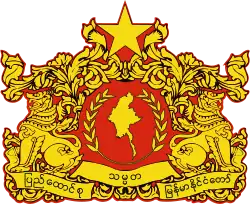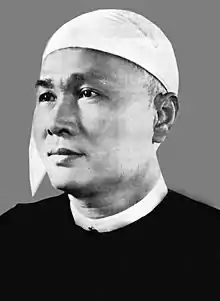1951–52 Burmese general election
General elections were held in Burma over several months between June 1951 and April 1952 due to internal conflict within the country.[1][2]
| ||||||||||||||||
All 250 seats in the Chamber of Deputies 126 seats needed for a majority | ||||||||||||||||
|---|---|---|---|---|---|---|---|---|---|---|---|---|---|---|---|---|
| Turnout | 18.75% | |||||||||||||||
| ||||||||||||||||
| ||||||||||||||||
 |
|---|
|
|
The first elections since independence, they saw the Anti-Fascist People's Freedom League (AFPFL) win 60% of the vote and 199 out of 250 seats. Voter turnout was low at 20%, as only 1.5 million voters out of an eligible 8 million participated.[3] It was the lowest turnout for a Burmese election since the 1920s boycotts in colonial Burma.[1]
Results
| Party | Votes | % | Seats | +/– | |
|---|---|---|---|---|---|
| Anti-Fascist People's Freedom League | 147 | –26 | |||
| AFPFL allies[lower-alpha 1] | 52 | +33 | |||
| People's Democratic Front[lower-alpha 2] | 19 | New | |||
| Independent Arakanese Parliamentary Group | 6 | New | |||
| Greater Burma Party | 0 | New | |||
| People's Peace Front | 0 | New | |||
| Union of Burma League | 0 | New | |||
| United Chin Freedom League | 0 | New | |||
| Independents | 15 | +13 | |||
| Vacant | 11 | – | |||
| Total | 250 | +40 | |||
| Total votes | 1,500,000 | – | |||
| Registered voters/turnout | 8,000,000 | 18.75 | |||
| Source: Nohlen et al. | |||||
- Included the Burma Socialist Party, the All-Burma Peasants Organisation, the Burma Muslim Congress, the Kachin National Congress (7 seats), the Union Karen League (13), the Chin Hills Congress, the United Hill People's Congress, the All-Burma Women's Freedom League, the All-Burma Federation of Trade Organisations and the Arakanese Muslim Association (3).[4][5]
- Alliance of the Burma Workers and Peasants Party (12 seats), the Patriotic Alliance and the Burma Democratic Party.[5]
References
- Taylor, Robert H. (1996). The Politics of elections in Southeast Asia. Cambridge, UK: Cambridge University Press. p. 173. ISBN 978-0-521-56443-4.
- Hoffmann, Mark S (1954). World almanac and book of facts, Volume 69. Newspaper Enterprise Association. p. 338.
- Rotberg, Robert I (1998). Burma: prospects for a democratic future. Brookings Institution Press. p. 43. ISBN 978-0-8157-7581-2.
- Dieter Nohlen, Florian Grotz & Christof Hartmann (2001) Elections in Asia: A data handbook, Volume I, p614 ISBN 0-19-924958-X
- Haruhiro Fukui (1985) Political parties of Asia and the Pacific, Greenwood Press, pp106–154
This article is issued from Wikipedia. The text is licensed under Creative Commons - Attribution - Sharealike. Additional terms may apply for the media files.

